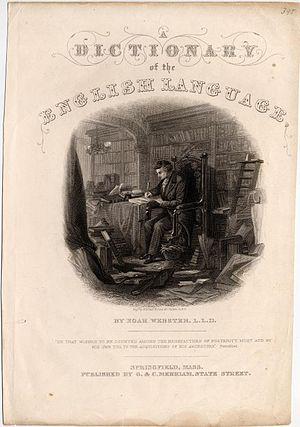
Title page of "A Dictionary of the English Language," written by Noah Webster. (Photo credit: Wikipedia)
Interested in learning English in language schools? Surely you will detail some of the knowledgeable facts concerning about the English language especially when you choose to Study English abroad. But of course, if you’re interested to know about some of these facts, we will freely provide it for you.
There are actually 50 being provided by Online Graduate Programs, but 10 would actually do.
English came from Germanic roots: When tribes from what is now Germany came to the land that would be England, they brought with them the language that would eventually grow into the dialect we use today.
There are three basic eras to English formation: Old English, which ran from the 5th through 11th centuries; Middle English, which lasted until the 15th century; and Modern English, which takes us to the present.
English disappeared from written language for a while: The Norman conquest of England in 1066 established Norman French as the upper-class language and relegated English to peasants. Churches keep records in French, and novelists write in that language. Basically, English stops being a written language for more than 100 years.
English literature didn’t reappear until after 1200: Changing political climates led to the Provisions of Oxford, a constitution-like document written in English in 1258. By 1300, English as a language had taken hold again.
“Set” has more definitions than any other English word: Twenty-five as a transitive verb, 11 as intransitive, 24 as a noun, and seven as an adjective. That doesn’t even count phrases.
“Irritate” and “aggravate” are different words: “Irritate” means “to annoy”; “aggravate” means “to make worse.” A lot of word pairs are easily mixed up, but most people don’t even know this is an error. But take it from a militant grammarian: it is. Oh, it is.
English dictionaries are older than you think: The first English dictionaries included words in other languages with their corresponding English meaning. Richard Mulcaster’s Elemantarie, a nonalphabetical list of 8,000 words (sounds, uh, helpful), showed up in 1592.
The first purely English dictionary appeared in 1604: It was called A Table Alphabeticall [sic], and it was written by a schoolteacher named Robert Cawdrey. It was far from a complete guide to the language, and it would take a century and a half for the next step to be made.
The first major dictionary showed up in 1755: Samuel Johnson’s A Dictionary of the English Language was nine years in the making and remained the most popular and trusted dictionary until the Oxford English Dictionary arrived 175 years later.
We owe our language to the Great Vowel Shift: Danish linguist Otto Jespersen coined the term Great Vowel Shift to refer to the period between 1450 and 1750 during which pronunciation rules for English changed drastically. This is when things started to sound the way they do now.

